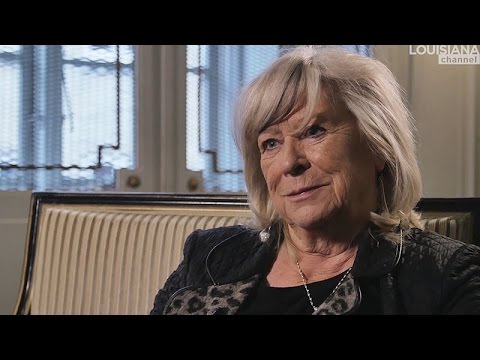
Award-winning film director Margarethe von Trotta – who has worked closely with the legendary directors Fassbinder and Schlöndorff – here shares the story of her winding road to becoming one of the leading contemporary German filmmakers.
Growing up, von Trotta didn’t go to the cinema very often, but rather to operas, concerts and plays: “Films weren’t really “art” for us. In Germany, films were sentimental with a regional background… you’d watch those on rainy Sundays, when there was nothing else to do.” This changed in the early 1960s, when she was studying in Paris and was introduced to the Nouvelle Vague by fellow students. This sparked an interest in going to the cinema, where she came across ‘The Seventh Seal’ by Ingmar Bergman, whose movies she developed a great fascination of “because his films combined everything. Art, painting, music, acting… Everything I had seen or heard before to a small degree, here and there.” Moreover ‘The Seventh Seal’ was the first of its kind to explore the concept of death: “Young girls think about death a lot. Especially those girls who were born in Berlin, like I was.”
Living in France in the 1960s, and being “attacked” for being German, she was also forced to confront her country’s past: “That’s why the 1968 movement took place. The young people took a stance against their parents’ generation.” Moreover, it was a time with hardly any female film directors, so her way into the industry became through acting in movies by e.g. Rainer Werner Fassbinder, where she absorbed all she could without revealing her true aspirations: “I realised deep down that I had the desire to direct. But I never would have dared to say it out loud. People would have laughed.”
Touching on the political environment in which they found themselves, von Trotta continues to argue that her generation of filmmakers – which she describes as “a group of rebels” – had finally begun to understand some things about their country and its past, which their movies reflected: “You can’t live in the world and observe it without letting anything in. But it wasn’t the primary reason we made films.”
Margarethe von Trotta (b. 1942) is a German film director who is often mentioned as a “leading force” of the New German Cinema movement. Her films mostly evolve around the relationships between and among women. Among her vast body of films are ‘Sisters, or the Balance of Happiness’ (Schwestern oder die Balance des Glücks) (1979), ‘Marianne and Juliane’ (Die bleierne Zeit) (1981), ‘Rosa Luxemburg’ (1986), ‘The Long Silence (Zeit des Zorns) (1993), ‘Rosenstrasse’ (2003) and ‘Hannah Arendt’ (2012). She has received numerous awards for her movies, including a Golden Lion and the FIPRESCI awards at the Venice Film Festival (1981), Guild Film Award-Gold (1983), Bavarian Film Award (1995), Golden Globe Award at the Golden Globes Italy (2003) and Taormina Arte Award (2004).
Margarethe von Trotta was interviewed by Marc-Christoph Wagner at Grand Teatret in Copenhagen, Denmark in November 2015.
Camera: Klaus Elmer
Edited by: Klaus Elmer
Produced by: Marc-Christoph Wagner
Copyright: Louisiana Channel, Louisiana Museum of Modern Art, 2016
source